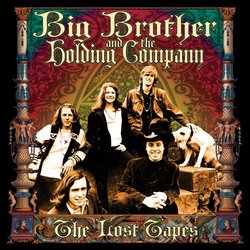Early Big Brother
Gordon Matthews | Durham, NC USA | 08/29/2008
(3 out of 5 stars)
"The second disc in this 2-CD set is not very "lost." It originally came out, minus the last track, on a vinyl Rhino LP called Cheaper Thrills. Then the British Edsel label put out a CD version called Live 1966, adding the last track (which is actually from 1967, recorded for the KQED radio station). Then the US Varese Sarabande label reissued it as Live In San Francisco 1966, plus there's some other CD reissue called, once again, Cheaper Thrills. The recording on the Varese Sarabande version (still available) is excellent, and both discs in this set are comparable.
I imagine that there are plenty of reviews available for what appears here as Disc 2, so I'm going to confine myself to reviewing Disc 1. There's no recording date given but it sounds to me like it's from the same period, 1966. Almost all of the material that has studio versions is from the first album, and the band isn't as sharp as they got to be later on, with the great Cheap Thrills album and the Live At Winterland 1968 disc that came out a few years ago. Of the songs that overlap on the two discs there isn't a lot of qualitative difference that I can discern, so what's of primary interest on Disc 1 is the new material, some of it previously unheard in any performance.
The Great White Guru is not so much a song as a repeated riff with Peter Albin telling a story over it, in the shouted southern preachin' style, about LSD. Amazing Grace this time comes in three parts. The first part is vocal harmony, in which Big Brother vies for the Grateful Dead's title for most wretched vocal harmonies ever (on the wonderful Live/Dead). It's not that, like the Dead, they can't hit the right notes (and what makes the Dead's efforts so spectacularly awful is that you usually can't even guess which notes they were trying to hit!)--what it sounds like to me is that Janis, Peter, and Sam Andrew are each singing in a different key! Following that there's a fast, punk-like run-through of the song with lots of choppy guitar chords; then that's followed by another Peter Albin sermon about LSD.
It's a Deal is an okay but unexceptional blues-rocker. Faster Pussycat, Kill, Kill actually is from the movie of the same name! The music for the film was written by Rick Jarrard, who produced Jefferson Airplane's Surrealistic Pillow! The track doesn't sound like anything I remember from the movie, but the spoken introduction does refer to it as an unsuccessful art film for which the soundtrack album is more visible than the film itself. How times change! Today Russ Meyer's film is considered one of the independent exploitation classics.
Turtle Blues is done here with full band backing. The piano version on Cheap Thrills is lots better, and there's no question that John Simon was wise to record it that way but it's an interesting curiosity to hear the song the way audiences were originally introduced to it.
So, all in all, it's a fun but not great album which I enjoyed but won't listen to all that often. As I said, it's from a period before the band hit its peak- but it is a performance by a working band, not by Janis Joplin with a backing band. On the songs Peter sings, she mostly just adds a few cheerleader-like whoops that remind me a bit of what you hear on Bob Wills recordings. But when you listen to the songs on which she takes the lead, it's easy to tell that there's a superstar in the making. This recording an artifact from another time, and the large amount of spoken introductions between the songs give it a strong "you are there" feel-- but I suspect that the stage patter sounded a lot more witty then than it does now.
"
Way before Monterey...
T. Horsefat | Napa CA | 07/31/2008
(5 out of 5 stars)
"...Big Brother and the Holding Company was a band which included a very talented, new female vocalist. This collection of recordings documents that wonderful year before they became Janis Joplin's backup band. Disc two's offerings have been given a sound-enhancing make-over that reveals subtle sonic details which previous releases of this material submerged in distortion. Disc two is, however, the star of the show, as most of this stuff has never before seen the light of day, unless on obscure bootlegs, and some of the songs can be heard nowhere else. The quality of the recording is better that that of disc two, and that matches the improved quality of the muscianship(James and Sam engage in some very interesting extended interplay). They're all a bit sloppy at times, but that was part of the San Francisco charm. Assuming this all came from the same show or series of shows, disc one's program was recorded in January 1967 at the Matrix in SF (8 months after disc two's show). Truncated teaser versions of "Amazing Grace" and "High-Heal Sneakers" appear on the album "Farewell Song"(with recording date noted). Here they are presented in full, complete with Peter Albin's acid-rant sermon, distorted guitar wailing from James and Sam, and melodic/rhythmic bits that would later evolve into their song "Catch Me Daddy". What comes out of both discs is just what BBHC was about as a real band. They were about taking musical chances, pushing their own and each other's envelopes, rocking out, and amusing their audience(at times, Peter Albin comes off as a cross between Dick Cavett and Tom Smothers -- witty, articulate, and strangely goofy). Too bad that so much had to change after Montery Pop..ped the magic bubble that encased this band in harmony. If your are a fan, you need this."


 Track Listings (12) - Disc #1
Track Listings (12) - Disc #1